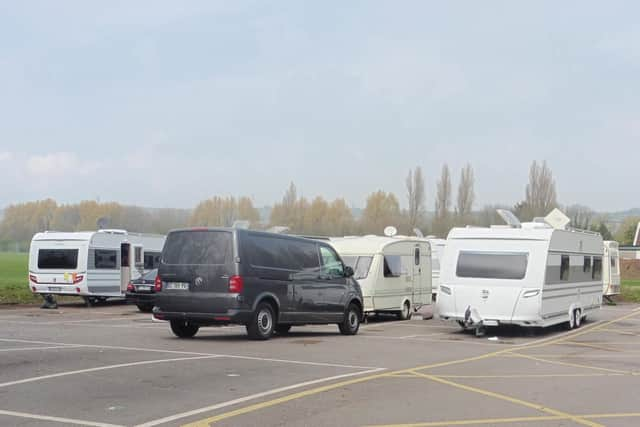Here are travellers’ rights when they move onto land


But what can the council, landowners and the police do when travellers set up a camp?
Here is what Portsmouth City Council says their rights are when they move onto land:
What is the difference between travellers and Gypsies?


Advertisement
Hide AdAdvertisement
Hide AdBoth Gypsies and travellers are both itinerant – which simply means that they travel from place to place.
However the term gypsy refers to the ethnic Romani people – who are off Indian origin and orginally entered Europe between the 14th and 15th century.
Romani are also known as Roma gypsies – and have their own Romani language which is separated into several different dialects.
While travellers refers to Irish travellers or the ‘walking people’. Like gypsies they are itinerant and move around, particularly in Ireland and the United Kingdom. But some emigrated to America.
Advertisement
Hide AdAdvertisement
Hide AdWhy do Gypsies and travellers follow a travelling lifestyle?
It has been these cultures’ way of lives for many years. They travel the country and set up camp in various locations in order to earn a living.
Does the council have a duty to move them when they are camped without the landowners permission?
No. If they are camped on council land then councils can evict them.
Advertisement
Hide AdAdvertisement
Hide AdBut if they’re on private land it would usually be the landowner’s responsibility.
The government has advised when Gypsies and Travellers are not causing a problem, the site may be tolerated.
If they are camped on private land what can the owner do?
Landowners should firstly talk to them and see if a leaving date can be agreed.
If an agreement is not met they can start proceedings in the county court under the Civil Procedure Rules 1998, to obtain a court order for their eviction.
Advertisement
Hide AdAdvertisement
Hide AdThere must be at least two clear days between the service of documents and the court hearing.
What if the landowner decides to let them stay on their land temporarily?
Unless they have already obtained planning permission for a caravan site or they are a farmer and the Gypsies and travellers are helping them (with fruit picking, etc.), then they could be in breach of the Planning Acts and Acts dealing with the licensing of caravan sites.
If the landowner fails to take the appropriate steps to remove them, what will the council do?
Advertisement
Hide AdAdvertisement
Hide AdIf the landowner is in breach of any planning or license requirements, the council will take proceedings against them to require removal of the unauthorised site.
What if they have been camping on the side of the road, in parks or other council-owned land?
If they are causing problems the travellers will be moved as soon as possible and reasonable.
In all cases, the site is visited and efforts are made to ensure they keep the site tidy and do not cause public health problems.
Refuse collection facilities may be provided.
Can they be removed from council land immediately?
No. The council must first:
- Show they are on land without consent.
Advertisement
Hide AdAdvertisement
Hide Ad- Make enquiries regarding the general health, welfare and children’s education.
- Ensure the Human Rights Act 1998 is fully complied with.
- Follow a set procedure in terms of providing ownership of land, details of the illegal encampment that will enable them to successfully obtain the necessary authority from the Court to order them to leave the site.
How long do they have before they are removed?
This will depend on the circumstances of each individual case – based on the issues above and when the council can get a court hearing date.
Can the court refuse to grant the council an order to move them on?
Advertisement
Hide AdAdvertisement
Hide AdYes. If there is an unavoidable reason for them to stay on site or if the court believes that the council have failed to make adequate enquiries regarding the general health and welfare of the group before going to court.
What can the police do?
They will visit all sites reported to them. In certain circumstances (for example, where the Gypsies and travellers have six or more vehicles), officers may use their powers under Section 61 of the Criminal Justice and Public Order Act 1994.
These powers will only be used in situations of serious crime or public disorder that are not capable of being addressed by normal criminal legislation and in which the illegal occupation of the land is the relevant factor.
For more information, contact police on 101.